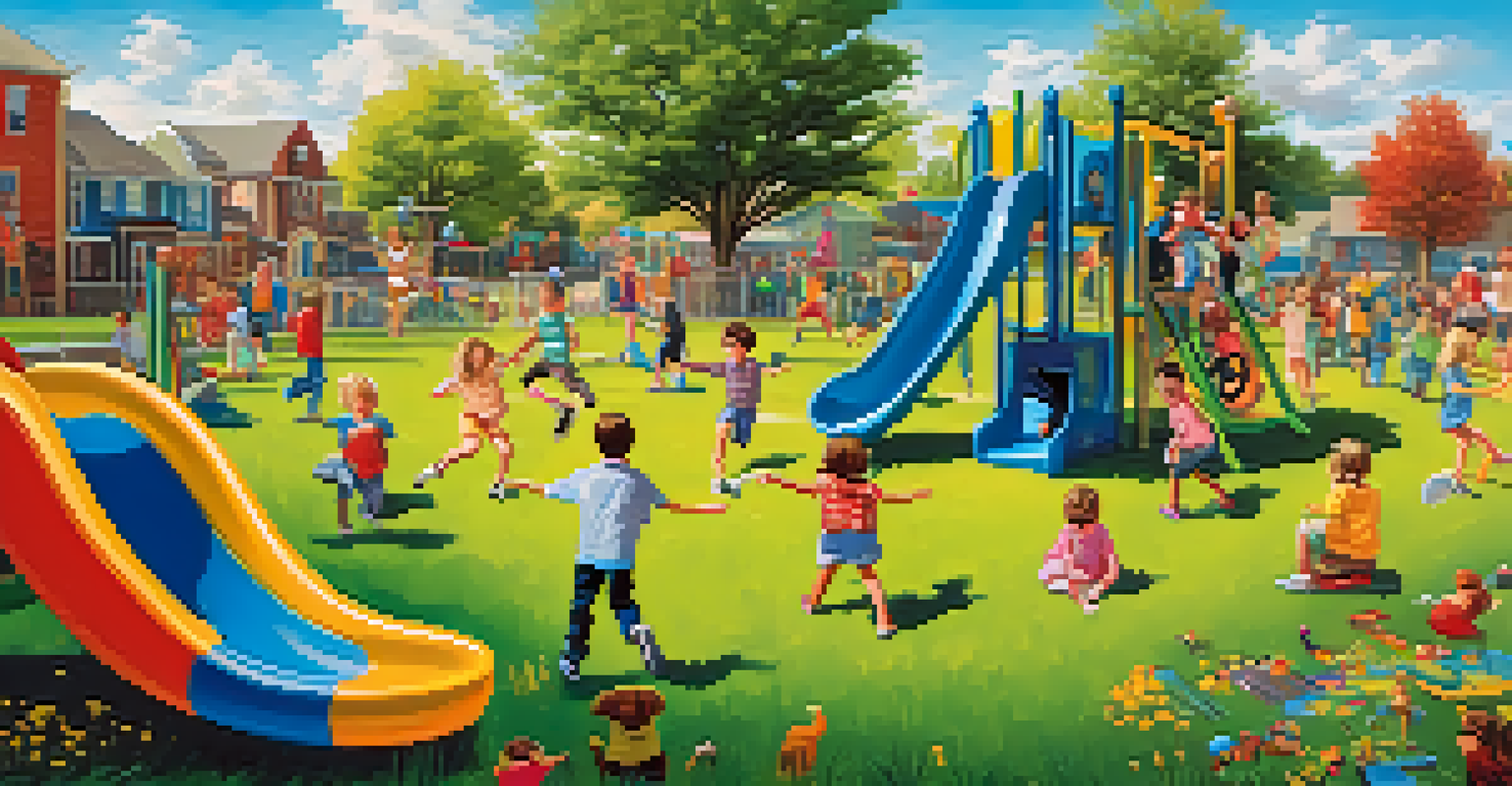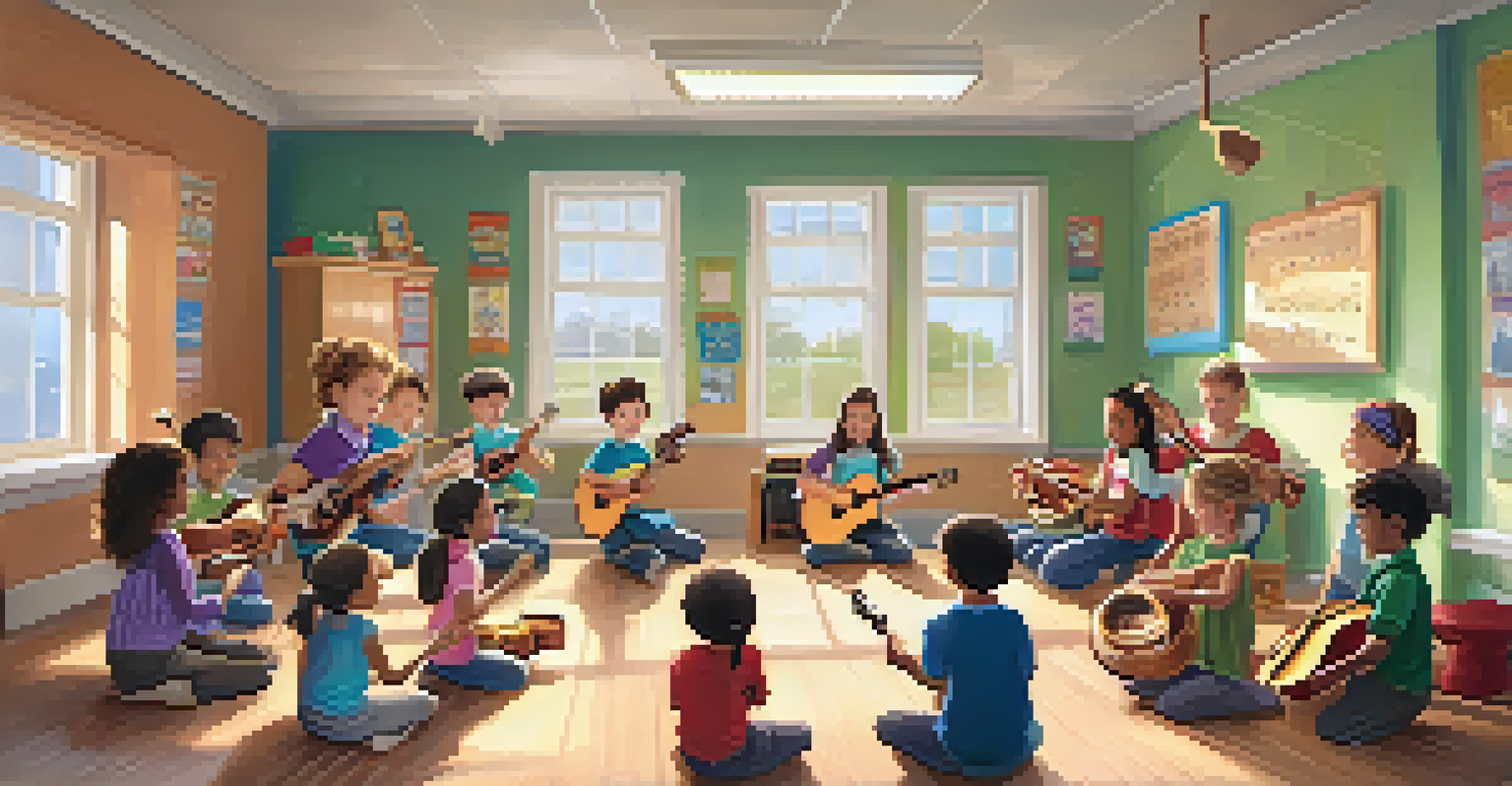Examining the Role of Lyrics in Language Development for Kids

Understanding Language Development in Early Childhood
Language development is a vital part of growing up, as it helps children express themselves and communicate effectively. During the early years, kids pick up language through various means, including interaction with caregivers and exposure to music. Songs, with their catchy tunes and repetitive phrases, play an essential role in this learning process. By engaging with lyrics, children can enhance their vocabulary and comprehension skills in a fun and enjoyable way.
Music can change the world because it can change people.
As they listen to songs, children often mimic the sounds and rhythms, which helps them grasp the nuances of language. This mimicry is not just about pronunciation; it also allows them to understand sentence structure and context. For example, when kids sing along to their favorite nursery rhymes, they become familiar with the patterns of speech, making it easier for them to construct their own sentences later on. Ultimately, these early interactions with language set the foundation for more complex communication skills.
Moreover, exposure to different genres and styles of music introduces children to diverse vocabulary and expressions. Whether it’s the playful tones of children’s songs or the storytelling nature of folk music, each lyric contributes uniquely to a child's linguistic repertoire. As they explore various themes and emotions through lyrics, children learn to articulate their feelings and thoughts more effectively, paving the way for successful social interactions.
The Role of Repetition in Learning Lyrics
Repetition is a powerful learning tool, especially for children. When they hear the same song multiple times, they start to recognize and remember the words, which reinforces their understanding of language. This repetitive exposure allows kids to internalize vocabulary, making it easier for them to recall and use these words in everyday conversations. Think of it as the building blocks of language; with each repetition, they solidify their foundation.

For instance, consider the classic children's song 'The Wheels on the Bus.' The repetitive nature of the lyrics allows kids to engage in a fun sing-along while simultaneously learning new words and phrases. Each verse builds upon the last, reinforcing both vocabulary and sentence structure. This kind of repetition not only aids in memorization but also instills a sense of rhythm and flow in their speech.
Music Boosts Language Skills
Engaging with songs enhances children's vocabulary, comprehension, and communication abilities.
Additionally, this repetition can boost confidence in language use. As children master the lyrics of their favorite songs, they gain a sense of accomplishment and are more likely to experiment with language in other contexts. This confidence is crucial for their overall communication skills, as it encourages them to express themselves more freely and creatively.
Lyrics Enhance Listening Skills in Children
Listening is a critical skill in language development, and engaging with lyrics can significantly enhance this ability. When children listen to songs, they not only hear the words but also pay attention to melody and rhythm, which all contribute to their understanding of language. This multisensory approach helps them to better discern sounds and improve their auditory processing skills.
The beautiful thing about learning is that no one can take it away from you.
For example, when kids follow along with lyrics on a screen or in a book, they learn to connect spoken words with written text. This connection is pivotal as it helps them transition from listening to reading, ultimately boosting their literacy skills. The more they practice listening to lyrics, the more adept they become at identifying different sounds and words, which is essential for effective communication.
Furthermore, songs often convey emotions and stories, prompting children to listen more carefully to understand the context. This deepens their comprehension skills and encourages critical thinking. By analyzing the meaning behind lyrics, children develop the ability to interpret language beyond its surface level, enriching their overall communication skills.
Incorporating Music into Daily Routines
Integrating music into daily routines can be a fun and effective way to support language development. Simple actions like singing during playtime or incorporating songs into bedtime routines can create a rich linguistic environment for children. This consistent exposure to music not only makes learning enjoyable but also reinforces the language skills they are developing.
For instance, parents can choose songs that reflect daily activities, such as washing hands or getting dressed, to help children associate words with actions. This kind of contextual learning solidifies their understanding and usage of language in practical situations. Plus, it turns ordinary moments into opportunities for bonding and learning, which is invaluable during early childhood.
Repetition Aids Learning
Repetitive exposure to lyrics helps children internalize language, improving their confidence and speech fluency.
Additionally, using familiar songs in new contexts can spark curiosity and encourage children to explore language further. For example, changing the lyrics of a well-known song to fit a new theme can stimulate creativity and language play. This playful approach to learning helps children become more adaptable and confident in their use of language.
The Benefits of Diverse Musical Genres
Exposing children to a variety of musical genres can significantly enrich their language development. Different styles of music introduce unique vocabulary, phrases, and cultural contexts that can enhance a child’s understanding of language. From pop and rock to classical and folk, each genre presents an opportunity for learning and exploration.
For example, listening to folk songs can introduce children to storytelling elements, while classical music may evoke emotions and inspire descriptive language. By exploring these different genres, children not only expand their vocabulary but also develop a richer appreciation for the nuances of language. This diversity in exposure helps them become more versatile communicators.
Moreover, engaging with various musical styles encourages children to express themselves in different ways. They may find that certain genres resonate with them more than others, influencing their own language use and creative expression. This sense of personal connection to music can foster a lifelong love for language and learning.
Encouraging Creative Expression through Lyrics
Lyrics can serve as a powerful medium for creative expression in children. Encouraging kids to create their own songs or modify existing lyrics allows them to explore language in a playful and imaginative way. This not only enhances their vocabulary but also promotes critical thinking and originality.
For instance, children can be prompted to write silly songs about their favorite animals or invent new verses to classic nursery rhymes. This kind of creative activity helps them experiment with words and phrases, leading to a deeper understanding of language structure and meaning. The joy of creating something unique can also boost their confidence in using language.
Diverse Genres Enrich Vocabulary
Exploring various musical styles introduces children to unique vocabulary and cultural contexts, enhancing their linguistic understanding.
Additionally, sharing their creations with family or friends fosters a sense of community and collaboration. This social aspect of language development is crucial, as it encourages children to communicate their thoughts and feelings openly. By expressing themselves through lyrics, they learn the importance of sharing ideas and connecting with others.
The Lasting Impact of Lyrics on Language Skills
The influence of lyrics on language development extends beyond childhood. The skills and vocabulary children acquire through music can have lasting effects on their future communication abilities. As they grow, these foundational language skills will support their literacy, academic success, and social interactions.
Moreover, a love for music can cultivate a lifelong interest in language and literature. Children who engage with lyrics may be more inclined to read, write, and explore different forms of expression as they mature. This ongoing engagement with language enriches their experiences and enhances their ability to articulate thoughts and ideas effectively.

Ultimately, the role of lyrics in language development is a testament to the power of music as a learning tool. By incorporating songs into children’s lives, we not only support their language skills but also foster a love for learning that can last a lifetime. Embracing the magic of music can lead to profound benefits in a child's journey of language development.